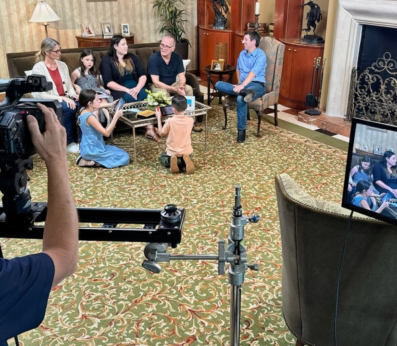In today’s fast-paced and ever-changing world, businesses and marketers find themselves navigating through a landscape that is constantly evolving. The rapid pace of technological advancement, coupled with shifting consumer behaviors, demands a fresh approach to business and marketing strategies. However, evolution does not always mean a complete departure from the past. Instead, it often involves refining existing practices while embracing the possibilities of the future. This article explores the concept of a new vision for business and marketing, emphasizing the power of storytelling and video marketing in establishing credibility and trust across various campaign objectives, including awareness, conversion, and repurposing.
Honoring the Pillars of the Past
Despite the dramatic changes in marketing channels and tools over the past three decades, the fundamental principles of business and marketing have remained remarkably consistent. These timeless principles revolve around understanding customer needs, delivering value, and effectively communicating the benefits of a product or service.
For instance, the transition from traditional billboards to digital banners or from handwritten letters to instant messaging platforms is less about changing the core message and more about adapting to the evolving communication landscape. Similarly, Google’s ever-evolving algorithms continue to strive towards providing users with relevant and valuable content.
These enduring principles serve as the foundation upon which the modern business world is built. They are the unwavering constants that guide businesses through the dynamic and ever-changing environment.
Training: The Catalyst for Adaptation
Acknowledging these foundational principles is crucial, but it is not sufficient to ensure success in the modern business landscape. The rapid advancement of technology demands ongoing learning and adaptation. This goes beyond mere information gathering; it involves structured training that transforms raw knowledge into actionable expertise.
In today’s digital age, staying ahead may require mastering the intricacies of new marketing software, understanding shifts in consumer digital behavior, or predicting the next significant trend in e-commerce. This continuous learning process ensures that businesses not only keep pace with change but also stay one step ahead.
The Nuanced Dance with Change
Change is inevitable, and resisting it can lead to obsolescence. We have witnessed industry giants topple because they failed to adapt to evolving market dynamics. However, change should not solely be a reactive response to problems; it should also involve proactive and strategic shifts, even when things appear to be going well.
The AI Revolution and Its Implications
One of the most transformative innovations of our time is the rise of Artificial Intelligence (AI). Its impact on business strategies, marketing campaigns, and customer interactions is profound and undeniable. AI is not merely a tool but a game-changer that offers businesses the opportunity to automate processes, personalize interactions, and optimize operations in unprecedented ways.
However, integrating AI presents challenges. Businesses must seamlessly incorporate AI without sacrificing the human touch. They need to leverage AI’s power without becoming overly reliant on it. Moreover, perception matters in the modern business landscape. It’s not enough to use cutting-edge tools like AI; businesses must also be perceived as forward-thinking and innovative. They should be active participants, setting trends and driving change rather than passive observers.
In Perspective
Reflecting on the past three decades, it becomes clear that while the tools and tactics in business and marketing have evolved significantly, the foundational principles remain steadfast. The challenge and opportunity lie in striking a balance between honoring these tried-and-true principles and embracing innovation.
Our journey forward entails blending the wisdom of the past with the possibilities of the present. While we harness the latest technologies, such as AI, we must never lose sight of the core principles that have brought us success. In this delicate dance between tradition and innovation, we find the blueprint for sustained success in the ever-evolving world of business and marketing.
The Power of Storytelling in Modern Marketing
In the realm of marketing, storytelling has emerged as a potent tool for capturing the hearts and minds of consumers. Storytelling transcends mere product descriptions and sales pitches; it creates an emotional connection with the audience. In an age where consumers are inundated with information, it’s the stories that stand out and leave a lasting impression.
The Psychology of Storytelling
Storytelling taps into the psychology of human behavior. Our brains are wired to respond to narratives. Stories evoke emotions, trigger empathy, and create a sense of relatability. When a brand tells a compelling story, it goes beyond selling a product; it sells an experience and a lifestyle.
Consider the success of companies like Apple, which has masterfully woven its brand narrative into its marketing campaigns. Apple’s story is about innovation, creativity, and challenging the status quo. It’s not just about selling iPhones and MacBooks; it’s about being part of a movement, a community of forward-thinkers.
Building Trust Through Authenticity
In an era where authenticity is highly valued, storytelling offers a means to build trust with consumers. When a brand shares its story, it humanizes itself. It shows vulnerability, shares challenges, and celebrates successes. This authenticity resonates with consumers, who are more likely to trust and support a brand that they perceive as genuine.
For instance, the rise of direct-to-consumer (DTC) brands in recent years has been driven by their ability to tell authentic stories. These companies often start with a founder’s personal journey or a specific mission. They use storytelling to connect with consumers on a deeper level, making them feel like a part of the brand’s story.
Storytelling Across Campaign Objectives
Storytelling is a versatile tool that can be applied to various campaign objectives, including awareness, conversion, and repurposing.
1. Awareness Campaigns
In awareness campaigns, the goal is to introduce a brand or product to a new audience. Storytelling plays a critical role in creating a memorable first impression. A well-crafted brand story can make a brand stand out in a crowded marketplace. Consider the famous Coca-Cola Christmas ads, which tell heartwarming stories of joy and togetherness during the holiday season. These stories not only promote the product but also associate it with positive emotions.
2. Conversion Campaigns
In conversion campaigns, the focus shifts to convincing potential customers to take action, such as making a purchase. Storytelling can be used to highlight the benefits and unique selling points of a product or service. Testimonials and case studies are forms of storytelling that demonstrate real-world success stories, building credibility and trust. For example, a fitness brand can showcase customer testimonials and success stories to inspire others to join their program.
3. Repurposing Campaigns
Repurposing campaigns involve recycling existing content or messaging to extend its reach and impact. Storytelling can breathe new life into old content by presenting it in a fresh narrative. Brands can revisit their origin stories or share behind-the-scenes anecdotes to engage their audience. By repurposing content through storytelling, brands can maintain consistency while keeping their audience engaged.
The Role of Video Marketing in Building Credibility and Trust
Video marketing has emerged as a dominant force in the digital marketing landscape. The combination of visuals, audio, and storytelling in video content makes it a powerful tool for establishing credibility and trust with consumers.
Visual Impact and Emotional Engagement
Video marketing allows brands to convey their messages with visual impact and emotional depth. It engages multiple senses simultaneously, creating a more immersive experience for viewers. A well-produced video can convey a brand’s values, personality, and story in a way that text or static images alone cannot.
Consider how Dove’s “Real Beauty” campaign utilized video to challenge conventional beauty standards. The campaign featured real women discussing their self-perceptions and insecurities, creating a powerful emotional connection with viewers. By using video to tell these personal stories, Dove not only built credibility but also sparked a broader conversation about self-acceptance and body positivity.
Transparency and Authenticity
Transparency is a cornerstone of trust-building in modern marketing. Video marketing allows brands to showcase their authenticity by giving viewers an inside look at their operations, culture, and people. Behind-the-scenes videos, company culture profiles, and interviews with team members all contribute to building trust by humanizing the brand.
For example, when a software company shares a video tour of its office and interviews with its development team, it provides a transparent view of the company’s inner workings. This transparency reassures potential customers that they are dealing with a legitimate and trustworthy organization.
Educational Content and Expertise
Video is an ideal medium for delivering educational content. By creating informative and valuable videos, brands can position themselves as industry experts. When viewers perceive a brand as knowledgeable and helpful, it fosters trust and credibility.
A great example of this is the “how-to” video format used by many brands. For instance, a home improvement retailer can produce instructional videos on DIY projects. These videos not only showcase the brand’s products but also demonstrate its commitment to helping customers succeed. As a result, viewers are more likely to trust the brand’s recommendations and products.
Video Marketing Across Campaign Objectives
Just like storytelling, video marketing can be applied to various campaign objectives, enhancing credibility and trust throughout the customer journey.
1. Awareness Campaigns
In awareness campaigns, videos can create a memorable introduction to a brand. Through visually compelling narratives, brands can capture the attention of their target audience and leave a lasting impression. Videos can tell the brand’s story, introduce its mission, and communicate its values in a way that resonates with viewers.
2. Conversion Campaigns
Video marketing plays a pivotal role in conversion campaigns. Product demonstration videos, customer testimonials, and explainer videos can all be used to showcase the benefits of a product or service. These videos provide evidence and build trust by showing potential customers how a product can solve their problems or fulfill their needs.
3. Repurposing Campaigns
In repurposing campaigns, brands can leverage existing video content to maintain consistency and engage their audience. They can repackage video testimonials, highlight reel moments, or behind-the-scenes footage to keep the audience interested. Repurposing video content allows brands to reinforce their credibility and trustworthiness with familiar narratives and faces.
Conclusion: The Future of Business and Marketing
In an era of relentless change and innovation, businesses and marketers must evolve while remaining rooted in timeless principles. Honoring the core principles of understanding customer needs, delivering value, and effective communication is essential. However, embracing new technologies and strategies, such as Artificial Intelligence, storytelling, and video marketing, is equally vital for staying competitive.
A new vision for business and marketing involves a delicate balance between tradition and innovation. It’s about blending the wisdom of the past with the possibilities of the present to chart a course for sustained success. Storytelling and video marketing serve as powerful tools for establishing credibility and trust across various campaign objectives, whether it’s raising awareness, driving conversions, or repurposing content.
As businesses embark on this journey, they must recognize that storytelling and video marketing are not mere trends but enduring strategies that resonate with human psychology and consumer preferences. By weaving compelling narratives and visual experiences into their marketing efforts, brands can connect with their audience on a deeper level, build lasting relationships, and thrive in an ever-evolving marketplace.



